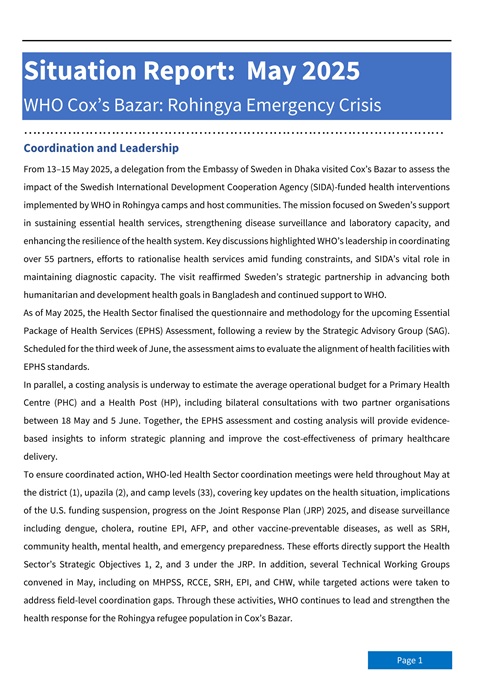WHO Cox’s Bazar: Rohingya emergency crisis - Situation Report: May 2025
Situation report

Overview
Coordination and Leadership
From 13–15 May 2025, a delegation from the Embassy of Sweden in Dhaka visited Cox’s Bazar to assess the impact of the Swedish International Development Cooperation Agency (SIDA)-funded health interventions implemented by WHO in Rohingya camps and host communities. The mission focused on Sweden’s support in sustaining essential health services, strengthening disease surveillance and laboratory capacity, and enhancing the resilience of the health system. Key discussions highlighted WHO’s leadership in coordinating over 55 partners, efforts to rationalise health services amid funding constraints, and SIDA’s vital role in maintaining diagnostic capacity. The visit reaffirmed Sweden’s strategic partnership in advancing both humanitarian and development health goals in Bangladesh and continued support to WHO.
As of May 2025, the Health Sector finalised the questionnaire and methodology for the upcoming Essential Package of Health Services (EPHS) Assessment, following a review by the Strategic Advisory Group (SAG). Scheduled for the third week of June, the assessment aims to evaluate the alignment of health facilities with EPHS standards.
In parallel, a costing analysis is underway to estimate the average operational budget for a Primary Health Centre (PHC) and a Health Post (HP), including bilateral consultations with two partner organisations between 18 May and 5 June. Together, the EPHS assessment and costing analysis will provide evidence-based insights to inform strategic planning and improve the cost-effectiveness of primary healthcare delivery.
To ensure coordinated action, WHO-led Health Sector coordination meetings were held throughout May at the district (1), upazila (2), and camp levels (33), covering key updates on the health situation, implications of the U.S. funding suspension, progress on the Joint Response Plan (JRP) 2025, and disease surveillance including dengue, cholera, routine EPI, AFP, and other vaccine-preventable diseases, as well as SRH, community health, mental health, and emergency preparedness. These efforts directly support the Health Sector’s Strategic Objectives 1, 2, and 3 under the JRP.
In addition, several Technical Working Groups convened in May, including on MHPSS, RCCE, SRH, EPI, and CHW, while targeted actions were taken to address field-level coordination gaps. Through these activities, WHO continues to lead and strengthen the health response for the Rohingya refugee population in Cox’s Bazar.
